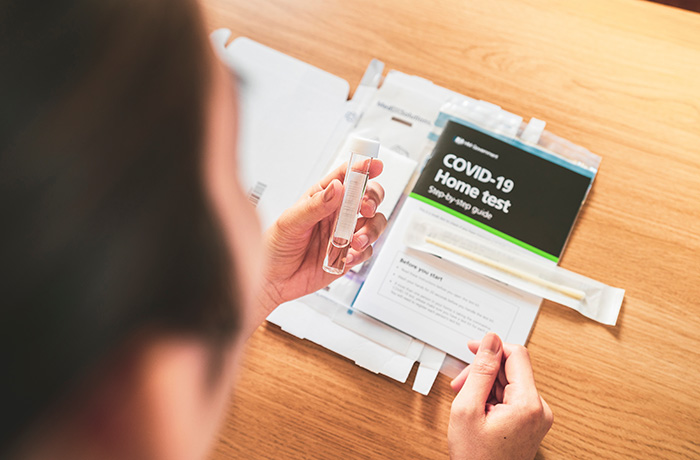
Maybe you’ve experienced this scenario: someone in your household contracts COVID-19. Even though you had considerable exposure to the virus, you repeatedly test negative. After close contact with someone who has COVID-19, why did you never get it? What happened?
Troubles with testing
According to Matthew Carr, MD, board-certified pathologist and medical director of Lab Services at Holland Hospital, there are several reasons a person can test negative after exposure to COVID-19. Someone may not use an at-home rapid test correctly by not inserting the swab far enough in the nasal cavity or circulating it enough.
Testing too early can also lead to a false negative because there may not be enough of the virus in one’s body to test positive. Dr. Carr recommends testing five or six days after exposure so the virus has built up enough for detection.
It is also possible that a person may be infected and even be symptomatic, but they might test negative simply because the virus has predominantly infected their throat or lungs rather than their nasal cavity.
Antibodies and other viruses
Another reason an exposed person may test negative is that vaccination or prior infection has created antibodies. In these cases, when someone is exposed to the virus, those antibodies are activated and rapidly clear the virus before they become infected or symptomatic.
Keep in mind that if a person tests negative for COVID-19 but still exhibits symptoms, they may have another virus like the flu or a respiratory syncytial virus (RSV), which a COVID-19 test would not pick up. That is why symptomatic patients at Holland Hospital receive a combination test that tests for multiple respiratory illnesses, including COVID-19.
What about false positives?
Most positives from COVID-19 tests are true positives; however, false positives are possible. “No test is perfect,” says D. Carr. “We expect every test to have some false negatives and some false positives.”
While it’s not clear why false positives occur, it may be caused by “cross reactivity” in which other viruses are present and cause a false positive.
Any time you get a positive result from a COVID-19 test, you should assume it is a true positive and quarantine to protect others. Dr. Carr suggests following up with a PCR test a few days later to confirm the first test gave a true positive.
Get vaccinated and boosted
“Getting vaccinated is very important,” said Dr. Carr. If someone is vaccinated, their immune response is activated after they are exposed to COVID-19. This immune response may be able to neutralize the virus before it can cause symptoms and replicate enough to spread to others.
Does this mean that vaccinated people don't need to avoid close contact with those who test positive for COVID-19? Not at all. “Even if you're vaccinated and boosted, you still need to make sure that you're taking precautions around people that are infected or symptomatic,” said Dr. Carr.
Where can I learn more?
If you have concerns about COVID-19 symptoms or exposure, contact your primary care provider. COVID-19 testing and vaccines remain available at most local pharmacies by appointment. And remember, the CDC recommends COVID-19 vaccines for everyone 6 months and older and boosters for everyone 5 years and older.
Learn more about the coronavirus response at Holland Hospital.